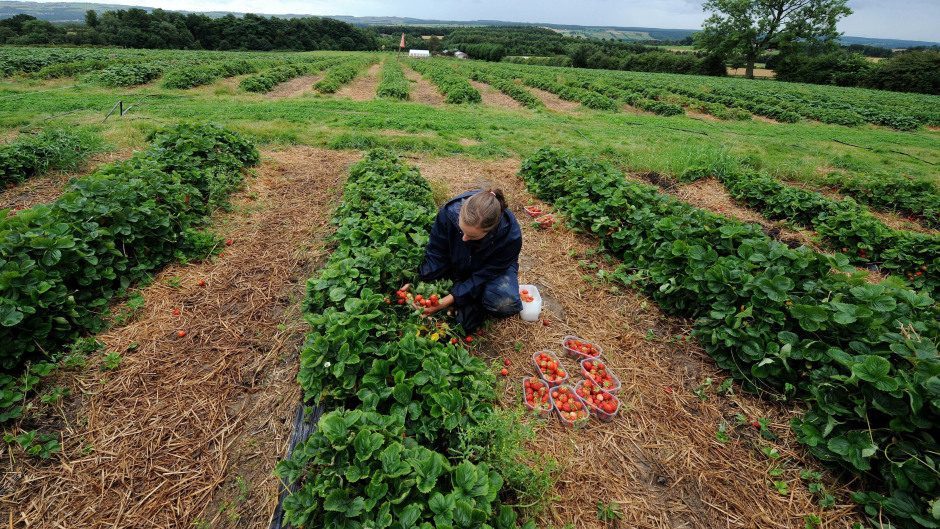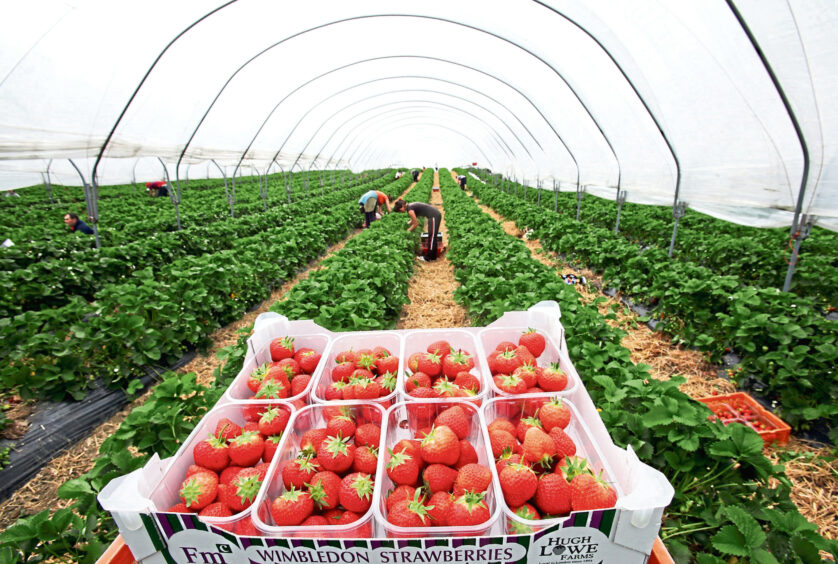Soft fruit growers in Scotland are already recruiting seasonal workers for next year alongside having to also make plans for a possible cut in production in 2023 if the available labour numbers and costs don’t add up.
The prospect of empty soft fruit tunnels next summer, matching the empty laying-hen houses which have led to the current egg shortage, is a very real possibility, according to Angela Porchez, general manager of Angus Growers, Arbroath.
“Production costs are a major challenge for us, and labour is at the heart of that,” said Ms Porchez, whose 17 grower members employed 3,000 seasonal workers last year to help them produce a total of 12,000 tonnes of soft fruit.
“Staffing costs used to account for about 40% of our expenditure but it is now somewhere between 60 and 70%.
“The combination of Brexit, Covid, and the cost-of-living crisis has driven production costs higher and higher while our returns from the market aren’t keeping pace.”
Coming on the back of warnings from the National Farmers Union in England that the UK is ‘sleepwalking’ towards food shortages, the dilemma at Angus Growers about how much they can afford to produce next year is hard to bear, for all concerned.
“We rely heavily on seasonal labour and are currently agreeing numbers for next season with our suppliers,” said Ms Porchez.
“This is being done under the UK-based seasonal workers visa scheme, which is working fine, although it is unfortunate the numbers aren’t higher.
“As a result, members are looking to see where they might cut back on production to accommodate any labour shortages that may arise.
“Wages are also a very big factor, of course, given that having fewer workers can mean having to pay those that are available overtime rates to cover the workload.
“The best seasonal worker is someone who has done the job before. In the past we had a lot of regulars returning to Scotland largely from Romania and Bulgaria, which was great.
Seasonal workers now from all over the world
“The labour pool now includes a huge mix of countries, stretching from Nepal to Barbados.
“No matter how good these workers may eventually become, first-timers need training and that adds even more to our costs.”
Much as the members of Angus Growers may wish to keep expanding production, as they have in recent years, they need to remain competitive with other growers across the UK and Europe if Scotland’s renowned reputation for quality soft fruit is to continue.
“We have to look at anything which might put us at a competitive disadvantage to growers in England, in particular,” said Ms Porchez.
“This includes aspects such as Scotland’s agricultural wages order and the Fair Work First Agenda.
Supermarket prices rise but retailers don’t pay growers more
“We understand that the Scottish Government wants to make it attractive for people to come and work in Scotland but, at the same time, we do need to make sure there are still actual companies left here to work for.”
While Angus Growers plan for 2023, negotiating their balancing act of production costs verses potential output, the industry’s “sleepwalking” message on food shortages continues to gather momentum.
“Growers are facing steep increases in costs, but they have not seen a similar increase in what retailers pay them,” warned British Berry Growers, who represent 95% of the country’s producers.
“Taking strawberries, for example, Kantar data reveals an 11% increase in supermarket prices while growers have seen a 0% increase in what retailers are paying them.
“If we don’t address this disconnect, British berry growers will start to reduce the numbers of berries they grow, as they are unable to make a profit. None of us want that.”
Agreeing wholeheartedly with this message is John Gray, managing director of Angus Soft Fruits, also based in Arbroath, who work with around 50 growers globally, including Angus Growers, to ensure a year-round supply of soft fruit to consumers.
“There is going to be less British and Scottish fruit and vegetables available in the future as things stand at present,” he said.
“Over the last two seasons our costs have gone up by almost 30% which leaves the sector close to being unsustainable.
“Similar to the current egg supply situation, we will almost certainly see some empty soft fruit polytunnels in Scotland next summer.”


